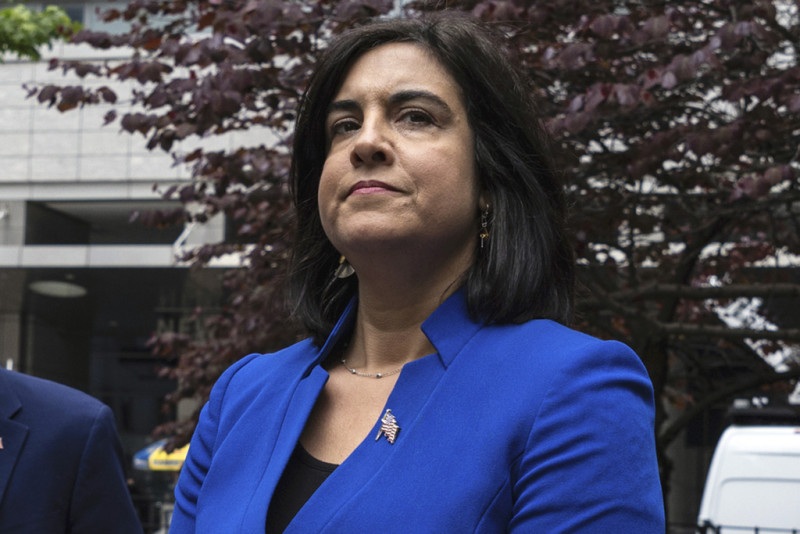Which famous Greek expatriates support Kamala Harris and which support Donald Trump – Where do Greek-Americans finally belong?
Response from USA, Christodoulos Athanasatos
NEW YORK. One of the constant mistakes that the Greek Common Opinion consistently falls into is the attempt to generalize the Greek-Americans – that is, the Americans of Greek origin or who have dual citizenship with the right to vote in the USA – in terms of their dominant political position in view of the upcoming presidential elections. This is a trend that has existed before, but has intensified, especially after the emergence of the controversial personality of Donald Trump and the socio-political polarization observed after 2016.
Both during the immediately preceding pre-election periods, and the present one, informal organizations of Greek Americans appeared who supported either Donald Trump or his current opponent, namely Hillary Clinton, Joe Biden and – today – Kamala Harris.
Recently, a group of 78 Greek-Americans ran a full-page paid op-ed in the Sunday front page of the New York Times, expressing her support of Kamala Harris.
1/9 WE ARE PROUD MEMBERS OF AN American community with a strong and distinctive cultural heritage of democracy. We believe our collective voice matters to preserve and advance the ideals that strengthen our community and country. pic.twitter.com/mMkBQkmfPI
— Greek Americans for Harris-Walz (@GRE4Democracy) October 23, 2024
In the list of signatories include, among others – except for elected officials or candidates of the Democratic Party – Hollywood starssuch as Nia Vardalos, John Stamos, Rita Wilson and her naturalized husband, Tom Hanks, businessmen such as former Paramount Pictures CEO Jim Yiannopoulos, Angelos Tsakopoulos and Dennis Mehiel, the journalist and author Nikolaos Gatzoniannis, the lawyer George Tsougarakis and the activist Eddy Zemenidis. Except for “78”one of the major donors to the Democratic Party is the Evia-born, real estate mogul George Marcus, who, according to a recent CNN report, donated seven figures to Kamala Harris’ campaign, having previously supported both Barack Obama and Joe Biden. Additionally, back in 2019, among the donors to Kamala Harris’s – failed – campaign for the then presidential candidate’s nomination was the well-known businessman Dean Mitropoulos.
On the other side, by well-known figures of the Greek-American diasporasupporter – and longtime acquaintance – of Donald Trump is the Greek-American billionaire John Katsimatidis and the also powerful businessman Michalis Psaros, while the recent event of “Greeks for Trump” in Philadelphia was attended by the doctor – radiologist Dr. Antonios Lymberakis, who is the president of the “Saint Andreas” Order of the Lords of the Ecumenical Patriarchate, but also Dimitris Logothetis, for many years an Ernst & Young executive and involved with various organizations connected to the diaspora, such as the Leadership of 100 in the Archdiocese of America and the National Hellenic Museum in Chicago.
On the list of famous expats who support Donald Trump – who of course includes fewer “shiny names” – is Alec Skarlatos, one of the heroes of the train in Paris in 2015, who – in a peculiar game of the times – was honored by Barack Obama at the White House. In fact, in 2020 he was a candidate for Member of Parliament – without success – in the 4th District of Oregon.
It is also worth mentioning that the only daily Greek-American newspaper, “Ethnikos Kyrykas”, recently published a statement of support (endorsement) for Vice President Kamala Harris.
Campaigns and minorities
In an ever-multicultural society such as the US, and with an electoral system where the balance of power in certain ambivalent states can decide the battle for just a few votes, candidate campaigns are forced to categorize their message and “penetrate” ” to national, racial or social minorities that could shape particular tendencies. That is, to attempt an additional identification that could make the difference.
In a recent webinar for Greek-Americans, the Kamala Harris campaign enlisted Rep. Dina Titus, California Lt. Governor Eleni Tsakopoulou-Kounalaki, and the presidential candidate’s economic campaign co-chair, Christine Bertolina-Faust, to based on their Greek origin, to address voters from the diaspora.
“Talk to your Republican Greek friends in your church and explain to them that this election is not about taxes – where we will certainly do well – but about preserving Democracy.” was a part of Mrs. Faust’s message.
For his part, the young Greek-American Christos Marafatsos, who as early as 2016 leads the informal organization “Greeks for Trump” as part of a wider circle of campaign advisers, he recently organized events aimed at the Greek diaspora, with the former president’s right-hand man – and by many a leading candidate for the leadership of the State Department if he returns to the White House – Ambassador Richard Gurnell as a central guest.
NDCTrump welcomes Christos G. Marafatsos “Greek Americans for Trump”@OMAROSA @CLewandowski_ @MichaelCohen212 pic.twitter.com/AEvuRIwYeb
— NDC Trump (@NDCTrump) May 5, 2016
“Greek Americans overwhelmingly support Trump because his policies align with the values most important to our community: religious freedom, national security and support for small business. Our internal polls show that 75% of Greek Americans support Trump”said Marafatsos.
A different approach has the group “Greeks for Harris” – which is not related to the movement that co-signed the announcement in the New York Times – with its founder, Harry Zika, emphasizing that Greeks identify with the current vice president in order to preserve ideals such as democracy and freedom.
“With more than 8,000 dedicated members, our team recognizes the critical importance of aligning with the leaders who embody the Greek ideals of freedom, democracy and independence and who will fight against Donald Trump to uphold those ideals and WIN !”, Harry Zikas had reported.
Finally, where do Greek Americans belong?
The answer is given by the conclusion of the data listed above: The vast majority of Greek Americans she belongs where she is placed within the context of trends in American society and less because of her ethnic origin. For example, Vardalos, Stamos and Wilson belong to the field of Arts and Hollywood, which anyway is more sympathetic to the Democratic Party and, in any case, mostly opposed to Trump’s agenda. George Marcus, Dean Mitropoulos, John Catsimatidis and other big businessmen have their own reasons – and certainly their own political point of view – for supporting one candidate or another. Harry Zikas and Christos Marafatsos could belong to the same ethnic group or attend the same Greek Orthodox parish but form a different opinion based on their own perceptions of the society in which they live. Denis Mehiel and Michalis Psaros have joined forces in causes such as the reconstruction of the National Pilgrimage of Saint Nicholas at the Zero Point, but this does not mean that they agree politically.
The wrong stereotypes include the opinion in Greece that the “Greek-American of Astoria” (s.s. where “Astoria” let’s put any area in any State where there is a traditional concentration of Greek-Americans of the previous generation) necessarily supports Donald Trump. Even if this is true, it has more to do with how they define their self-interest at an individual level rather than necessarily with a right-wing political tendency of Greek origin, which was observed in immigration waves of previous decades: The “Greek-American of Astoria” and of every Astoria, if we are talking about an older immigrant who settled in the USA, has a good chance of belonging to a category of American small and medium /mid-sized businessmen that underpins the issues Trump’s agenda promotes, namely lower taxes and public safety, while also expressing a desire for stronger policing. This particular category may therefore fervently support Trump, whether they are of Greek origin, or Italian, etc. The next – American-born – generations, with a significant percentage of higher education and clearly greater friction with the academic part and contemporary topics of discussion, may differ, depending on their own priorities.
As a consequence of this – and in an intense period of polarization – a percentage removes Greece from the list of priorities. For example, there are many Greek-American Democratic Party voters who would be delighted if, in a complete reversal of fortunes, New York’s 11th District Republican Assemblywoman, Nicole Malliotaki, failed to be re-elected on the evening of November 5.
Who exactly is Mrs. Malliotaki? A solid ally of Greek issues in Congresswhich she co-signs or promotes any intervention against Turkey and Recep Tayyip Erdogan on Greek-Turkish or regional issues in the Federal Parliament. At the same time, however, she does not cease to be a loyal ally of Donald Trump, who had actually questioned the outcome of the 2020 elections, even hours after the shameful events of January 6. For the aforementioned voters, Nicole Malliotaki, although Greek-American, is primarily an additional unit in the legislative quiver of the Trump agenda, and that is what counts most.
On the contrary, two years ago in Pennsylvania, we know that there were Greek-American Republicans who supported and voted for the candidacy of Dr. Mehmet Oz in the Senate, who had the blessings of Donald Trump. What was this Dr. Mehmet Oz? A Turkish citizen, chosen by Recep Tayyip Erdogan, who would be a stentorian voice for Ankara within the walls of Congress.
But who cared about that when the GOP recapture of the Senate was vote-by-vote at stake? In the end, fortunately for us, the controversial Democrat John Fetterman disproved the pre-election image against him and blocked the way of Dr. Oz to the Capitol.
In the middle of the road, there is the Greek-American lobby, members of organizations and those interested in Greek-American issues: At the restaurant “Dionysos” in Astoria, which is connected to the organization “Pankyprio”, the president Philip Christopher, together with officials of AHEPA and others organizations, have welcomed from the current president Joe Biden – during his time as a Senator – the Philhellenic former Senator Bob Menendez, the expatriate Congressman Chris Pappas and also the Democratic vice chairman of the House Foreign Affairs Committee, Gregory Meeks to Republicans such as the mentioned Nicole Malliotaki , organizing fundraising events for their election campaign.
“We are neither Democrats nor Republicans here. Our priority is Greece and Cyprus”, Mr. Christopher always states in his introductory speeches, with the participants – regardless of who they will prefer for President on November 5th – in some parliamentary districts around the country they will support candidates of different party origins.
Because no one can really be absolutely sure how a Greek thinks…
Source :Skai
With a wealth of experience honed over 4+ years in journalism, I bring a seasoned voice to the world of news. Currently, I work as a freelance writer and editor, always seeking new opportunities to tell compelling stories in the field of world news.












